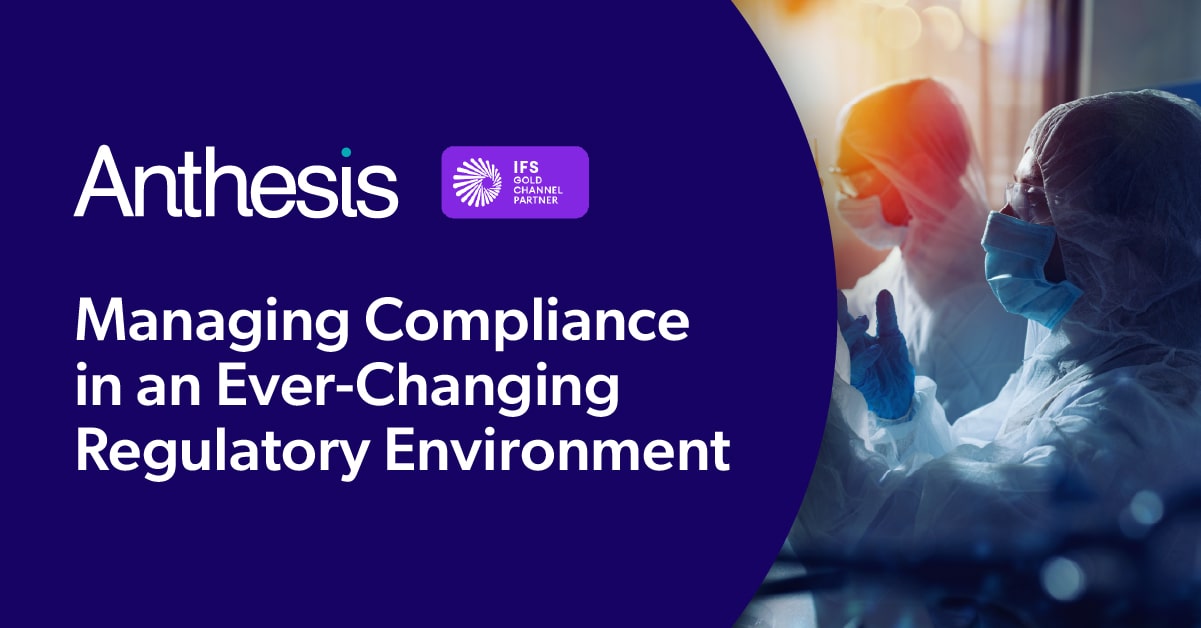Anthesis looks at how a modern ERP can help chemicals manufacturers deliver best practice when managing compliance across multiple systems.
If you’re a chemicals manufacturer and operate a number of different systems, there’s a good chance that you spend a proportion of your time worrying about maintaining compliance with ISO45001, REACH, TSCA, or CSIA.
Because effective compliance requires careful management of processes, formulae and materials, running multiple systems often impedes the speed at which processes can be reviewed and as such, being audited can be painful.
Fostering speed with scale
If this resonates, the good news is that you are not alone. Many chemical manufacturers run numerous best-of-breed software solutions to address challenges around managing formulations ; production management; quality control; batch traceability; and reporting. However, because these are typically heavily customised, their ability to communicate with each other, especially at scale, is limited.
As such, businesses often find reacting to changes in regulations difficult and are then forced to deal with enormous checklists to apply to systems when regulations change. To add insult to injury, legacy systems are notoriously slow to catch up and often cannot be configured to achieve compliance in a short space of time.
Given that regulatory compliance, and the management of associated changes, represent the lifeblood of a chemicals business, it’s not an area that can be taken for granted. Waste, cross-contamination, and decay clearly come with huge cost penalties as well as safety considerations. As a result, an inability to respond to changes at a regulatory level, in a timely manner, can be hugely costly, in safety, financial and reputational terms.
A picture of best practice
Best practice compliance is key to remaining competitive in an industry that consistently demands the highest quality delivered in a safe, efficient manner. Yet, the scenario described above seems largely to have been accepted as the norm in many businesses and there is often a belief that the investments made in systems are far too large, or indeed systems are too complex, to change.
Thankfully, industry-specific digital platforms are facilitating ways to work smarter, faster, more collaboratively, and with greater intelligence. Business systems, like IFS Cloud for example, offer a solution built to handle the challenges of new compliant raw material introduction and allows quality control data to be effectively managed. It overcomes the risk inherent in managing multiple systems, bypassing costly integrations with a single application encompassing precisely the functionality required. Flexibility is at the heart of the platform, with configurable processes to ensure quality assurance is compliant with the specific standards required.
Compliance with regulatory frameworks such as REACH is simplified using IFS Cloud, reducing data duplication through easy access to key documents and product-handling data. IFS brings audit compliance, planning, quality control and manufacturing execution into a single point with live data at all times, represented in clear, easy-to-configure dashboards and with simple back-and-forth tracing of components and processes. Many IFS users have removed hours from their trace processes simply by putting this data into a single system. The almost instant availability of documents via IFS Document Management, and key insights, ensures simple, but watertight, practices.
New revenue models
With this, it is easy to see why the Industry 4.0 revolution is gaining momentum. But have you considered the other reason why the Internet of Things and Industry 4.0 movement could truly be a game changer for you? In industrial machinery, the industry is evolving. Profit is not only restricted to providing the machinery – it has been significnatly outgrown by servicing options.
A PWC annual report suggests 90% of UK manufacturers are beginning to realise the revenue potential of service management for sold and managed machinery (This is shifting the value for the manufacturer into an ongoing operating revenue stream). Service contracts provide recurring revenue, visibility of inventory requirements, and minimise unscheduled maintenance to remove costly downtime for your customers.
Looking ahead
Compliance is a requirement that is only going to build. The cost and reputational risks of doing things the old way are becoming increasingly unsustainable.
If you want to understand more about how Anthesis can turn a complex business landscape to a single-instance business application built in the latest technology, and supplied in an Evergreen deployment method, please contact us.



